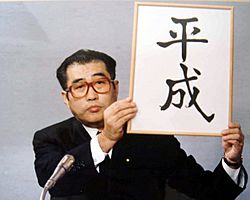Keizō Obuchi facts for kids
Quick facts for kids
Keizō Obuchi
|
|
|---|---|
|
小渕 恵三
|
|
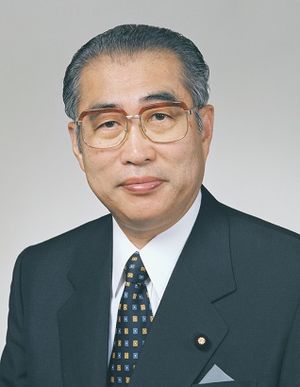 |
|
| Prime Minister of Japan | |
| In office 30 July 1998 – 5 April 2000 |
|
| Monarch | Akihito |
| Preceded by | Ryutaro Hashimoto |
| Succeeded by | Yoshiro Mori |
| Minister for Foreign Affairs | |
| In office 11 September 1997 – 30 July 1998 |
|
| Prime Minister | Ryutaro Hashimoto |
| Preceded by | Yukihiko Ikeda |
| Succeeded by | Masahiko Kōmura |
| Chief Cabinet Secretary | |
| In office 6 November 1987 – 3 June 1989 |
|
| Prime Minister | Noboru Takeshita |
| Preceded by | Masaharu Gotoda |
| Succeeded by | Masajuro Shiokawa |
| Director General of the Prime Minister's Office | |
| In office 9 November 1979 – 17 July 1980 |
|
| Prime Minister | Masayoshi Ōhira |
| Preceded by | Asao Mihara |
| Succeeded by | Taro Nakayama |
| Director General of the Okinawa Development Agency | |
| In office 9 November 1979 – 17 July 1980 |
|
| Prime Minister | Masayoshi Ōhira |
| Preceded by | Asao Mihara |
| Succeeded by | Taro Nakayama |
| Member of the House of Representatives for Gunma 3rd District |
|
| In office 21 November 1963 – 14 May 2000 |
|
| Personal details | |
| Born | 25 June 1937 Nakanojō, Gunma, Empire of Japan |
| Died | 14 May 2000 (aged 62) Tokyo, Japan |
| Political party | Liberal Democratic Party |
| Spouse |
Chizuko Ono
(m. 1967) |
| Children | 3, including Yūko |
| Alma mater | Waseda University (BA) |
| Signature | |
Keizō Obuchi (小渕 恵三, Obuchi Keizō, 25 June 1937 – 14 May 2000) was a Japanese politician. He served as the Prime Minister of Japan from 1998 to 2000.
Obuchi was elected to the House of Representatives in 1963. He was the youngest lawmaker in Japanese history at that time. He was re-elected to his seat many times. Obuchi became a key figure in the Liberal Democratic Party. He held important roles like Chief Cabinet Secretary and Minister for Foreign Affairs. He became Prime Minister in 1998. His time as Prime Minister focused on helping Japan's economy. Obuchi fell into a coma in 2000 and passed away shortly after.
Contents
Early Life and Education
Obuchi was born on June 25, 1937, in Nakanojō, Gunma. His father was a politician in the National Diet. When he was 13, Obuchi moved to Tokyo for middle school. He lived there for the rest of his life.
In 1958, Obuchi started studying English literature at Waseda University. He hoped to become a writer. However, his father died that same year. Obuchi then decided to follow in his father's footsteps and become a politician. After getting his degree in English in 1962, he studied political science.
Between January and September 1963, Obuchi traveled around the world. He visited 38 countries and took odd jobs to earn money. He worked as a dishwasher, an aikido instructor, and a TV camera assistant. In the United States, he met Robert F. Kennedy, who was then the Attorney-General.
Political Career
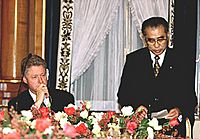
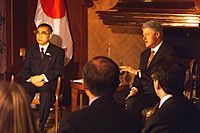
After his travels, Obuchi ran for the House of Representatives. He was elected in November 1963, at just 26 years old. This made him the youngest lawmaker in Japanese history. He continued his studies at Waseda University while serving in the Diet.
In 1979, Obuchi got his first cabinet job. He became the director of the Prime Minister's office. He also directed the Okinawa Development Agency. He held these roles for eight years. In 1987, he became Chief Cabinet Secretary.
Two years later, in 1989, Obuchi announced the death of Emperor Shōwa. As Chief Cabinet Secretary, he also announced the new era name, "Heisei", for the new Emperor Akihito. Because of this, people nicknamed him "Uncle Heisei" (平成おじさん, "Heisei Ojisan").
In 1991, Obuchi became the secretary general of the Liberal Democratic Party (LDP). In 1994, he became its vice president. In 1997, Ryutaro Hashimoto made Obuchi the Minister of Foreign Affairs. In this role, he worked on talks with Russia and discussions about the unification of Korea.
Becoming Prime Minister
In 1998, Ryutaro Hashimoto resigned as LDP president. This happened after the party lost its majority in the House of Councillors. Obuchi was chosen to replace him. The Constitution of Japan states that if the two parts of the Diet cannot agree on a Prime Minister, the choice of the House of Representatives wins. Since the LDP had a large majority in the lower house, Obuchi became Prime Minister on July 30.
During his time as Prime Minister, Obuchi focused on two main goals. He wanted to sign a peace treaty with Russia. He also wanted to help Japan's economy recover from the "Lost Decade". To boost the economy, he increased public spending and lowered income taxes. His government even gave shopping coupons to millions of citizens. This was hoped to encourage people to spend more money.
Later Life and Passing
On April 1, 2000, Obuchi suffered a serious stroke. He fell into a coma while still serving as Prime Minister. It became clear he would not recover. Yoshirō Mori replaced him as Prime Minister on April 5. Obuchi passed away on May 14, 2000, at age 62. A state funeral was held for him on June 8. Many important people from around the world attended, including UN Secretary General Kofi Annan and U.S. president Bill Clinton.
Personal Interests
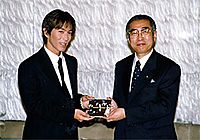
Obuchi married Chizuko Ono in 1967. They had one son and two daughters. Their younger daughter, Yūko Obuchi, later became a politician herself. She was elected to her father's former Diet seat.
Obuchi enjoyed the works of the historical novelist Ryōtarō Shiba. He especially admired Sakamoto Ryōma, a key figure in Japanese history. Obuchi also had a unique hobby: collecting figures of oxen. He was born in the Year of the Ox in the Chinese zodiac. He started his collection after being elected to the Diet in 1963. Over the years, his collection grew to thousands of figures. He also enjoyed aikido and golf.
Honors and Awards
- Medal of Honour with Yellow Ribbon for Best Father (1999)
- Grand Cordon of the Order of the Chrysanthemum (2000; given after his death)
- Senior Second Rank (2000; given after his death)
- Golden Pheasant Award of the Scout Association of Japan (1998)
See also
 In Spanish: Keizō Obuchi para niños
In Spanish: Keizō Obuchi para niños
 | Emma Amos |
 | Edward Mitchell Bannister |
 | Larry D. Alexander |
 | Ernie Barnes |


